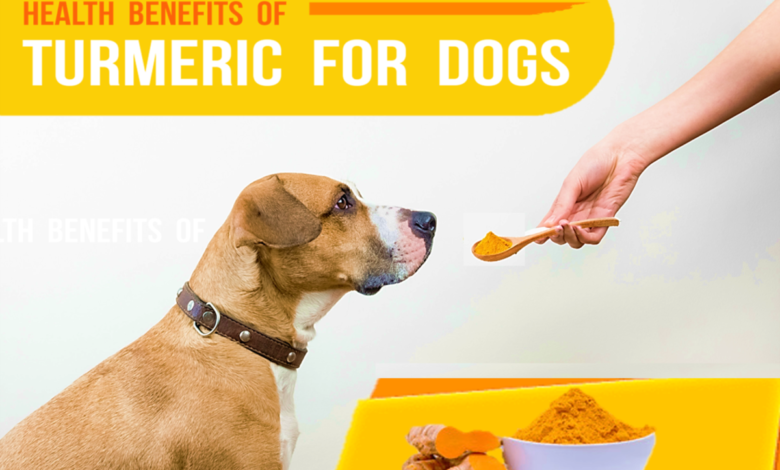TURMERIC BENEFITS: this time not for you but for dogs, yes for dogs!

Turmeric is a remarkable spice that offers a multitude of health benefits for our canine companions. This vibrant, yellow-orange root, turmeric benefits, which belongs to the ginger family, has long been prized for its medicinal properties in traditional Asian medicine, and its popularity is now gaining traction in the Western world, both for human and animal health.
turmeric benefits, One of the primary reasons why turmeric is so beneficial for dogs is its powerful anti-inflammatory properties. As our furry friends age, they often experience joint stiffness and mobility challenges, much like humans. Turmeric’s active compound, curcumin, has been extensively studied for its ability to reduce inflammation, making it an excellent natural remedy for supporting healthy joints and improving overall mobility.

In addition to its joint-supporting abilities, turmeric also boasts impressive digestive health benefits. By promoting healthy digestion and nutrient absorption, this versatile spice can help alleviate gastrointestinal issues, such as nausea, diarrhea, and gas, in our canine companions. turmeric benefits, This is particularly useful for dogs with sensitive stomachs or those recovering from illness or surgery. Furthermore, turmeric’s antioxidant properties make it a powerful tool in the fight against cancer.
Numerous studies have suggested that curcumin, the active compound in turmeric, may possess anti-cancer properties, helping to prevent the growth and spread of tumors. By incorporating turmeric into your dog’s diet, you can provide an added layer of protection against this devastating disease. Interestingly, turmeric’s benefits extend beyond physical health; it can also support cognitive function in dogs.
Table of Contents
Turmeric benefits, As our canine companions age, they may experience cognitive decline, but turmeric’s neuroprotective effects may help to maintain brain health and preserve memory and learning abilities. Finally, turmeric’s impact on skin and coat health is not to be overlooked. Its anti-inflammatory and antioxidant properties can help soothe skin irritations, reduce itching, and promote a shiny, healthy coat, making it a valuable addition to any dog’s grooming regimen.
As more veterinarians recognize the remarkable benefits of plant-based compounds, turmeric is becoming increasingly common in pet supplements, particularly those formulated for joint health. These specialized supplements are designed to provide dogs with the optimal dosage of turmeric, ensuring they can reap the full range of its therapeutic benefits. In conclusion, turmeric is a truly remarkable spice that offers a wealth of health advantages for our canine companions.

From reducing inflammation and supporting joint health to improving digestion, cognitive function, and skin/coat condition, this versatile root is a must-have addition to any dog’s diet. By incorporating turmeric into your pet’s routine, you can help them maintain their overall well-being and enjoy a long, healthy life by your side. Inflammatory Response: How Does Turmeric Work? As dogs age, their bodies naturally produce more free radicals
turmeric benefits, unstable atoms that can cause widespread cellular damage and impair healthy tissue function. When dogs are young, their bodies are able to effectively neutralize these harmful free radicals through their natural antioxidant defense systems. However, this protective mechanism tends to decline as dogs grow older.
As a dog’s antioxidant capacity diminishes with age, their body parts – especially the joints – become more susceptible to the ravaging effects of free radical stress and inflammation. turmeric benefits This is where the potent antioxidant properties of turmeric come into play, helping to scavenge and neutralize these damaging free radicals. Turmeric contains active compounds called curcuminoids, the most prominent being curcumin.
Curcumin has been extensively researched for its powerful anti-inflammatory and antioxidant effects. It works by inhibiting the activity of pro-inflammatory enzymes and cytokines that drive the inflammatory response. By modulating these inflammatory pathways, curcumin can help mitigate joint pain, swelling, and stiffness in aging dogs.
turmeric benefits, In addition to its antioxidant effects, turmeric also exhibits neuroprotective properties that may benefit senior dogs experiencing cognitive decline. The antioxidant and anti-inflammatory actions of curcumin have been shown to support brain health and function by reducing oxidative stress and neuroinflammation.
.How Much Turmeric Should You Give Your Dog?
The recommended dosage of turmeric for dogs is typically based on their body weight. Supplements formulated specifically for canine use will provide the appropriate dosage guidelines. It’s important to start with a lower dose and gradually increase to the recommended amount, monitoring your dog for any potential side effects.
When selecting a turmeric supplement, look for products that have been third-party tested and certified by organizations like the National Animal Supplement Council (NASC). This ensures the supplement contains the stated amounts of active ingredients and meets quality manufacturing standards. What Are the Side Effects of Turmeric for Dogs? While turmeric is generally considered safe for dogs, it’s important to be aware of potential side effects, especially when introducing it for the first time.
Some dogs may experience gastrointestinal issues like diarrhea, nausea, or vomiting. In rare cases, turmeric may interact with certain medications, turmeric benefits, so it’s always best to consult with your veterinarian before starting your dog on a turmeric supplement regimen.
By understanding how turmeric works to support your dog’s health, you can make an informed decision about incorporating it into their wellness routine, turmeric benefits, especially as they age. As with any supplement, it’s crucial to follow dosage guidelines and monitor your dog closely for any adverse reactions. supplements containing turmeric include vomiting and diarrhea. turmeric benefits
You can reduce the chance of these side effects by giving your dog the supplement during meals or after they’ve eaten. Turmeric, a spice commonly used in Indian and Middle Eastern cuisines, has gained popularity as a dietary supplement for dogs due to its potential health benefits. However, it’s important to be aware that the use of turmeric-containing supplements can sometimes lead to undesirable side effects, such as vomiting and diarrhea.
turmeric benefits, These gastrointestinal issues can occur when the dog’s body has difficulty absorbing or processing the turmeric compound. To help minimize the risk of these side effects, it’s recommended to administer the turmeric supplement to your dog during meals or immediately after they have finished eating.
Turmeric is a spice that has been used for centuries in various culinary and medicinal applications, and its potential benefits for dogs have recently gained attention. While the use of turmeric in dog food is primarily for enhancing the color and flavor of the kibble, there is some evidence that it may offer potential health benefits when consumed in appropriate doses.
One of the most well-known compounds found in turmeric is curcumin, a phytonutrient that has been extensively studied for its anti-inflammatory properties. A study published in the Journal of the American Veterinary Medical Association found that curcumin may support healthy joint mobility and comfort in dogs. This is particularly relevant for canine companions who may be experiencing age-related joint issues or discomfort.
turmeric benefits, Purina nutritionist Karina Carbo-Johnson, MS, further elaborates on the potential uses of turmeric in the pet supplement space. “Turmeric has been used in humans for years and has gained popularity in the pet supplement space,” she says.
turmeric benefits, This growing interest among pet owners reflects a desire to explore natural and holistic approaches to supporting their furry friends’ overall well-being. However, it’s important to note that the levels of turmeric used in dog food for coloring or flavoring purposes are not likely to provide the same anti-inflammatory benefits that are observed in human studies.
In other words, while turmeric is generally safe for dogs to consume in small amounts, pet owners may not see the same dramatic effects as they might in their own use of the spice. For dog owners who are interested in exploring the potential benefits of turmeric for their canine companions, Carbo-Johnson suggests looking into specialized pet supplements that contain higher concentrations of the active compounds.
“The Brain Health chew tabs from EverRoot have turmeric root powder as an active ingredient,” she notes, providing an example of a product that may offer more targeted support. As with any dietary supplement or change in a dog’s routine, turmeric benefits
it’s always best to consult with a veterinarian before introducing turmeric or any other new ingredient into a dog’s diet. This ensures that the individual needs and health status of the dog are taken into consideration, and that any potential interactions or side effects can be properly addressed.
This approach can help the turmeric be better tolerated by the digestive system, as the presence of food can slow down the absorption and distribution of the active compounds. Additionally, it’s crucial to follow the dosage instructions provided by the supplement manufacturer or your veterinarian. Exceeding the recommended dosage can increase the likelihood of experiencing side effects.
turmeric benefits, It’s also a good idea to introduce the turmeric supplement gradually, starting with a small amount and gradually increasing the dose over time to allow your dog’s body to adjust. If you do notice any signs of discomfort, such as vomiting or diarrhea, after giving your dog a turmeric supplement, discontinue use and consult your veterinarian. They can provide guidance on alternative options or adjust the dosage to better suit your dog’s individual needs.






